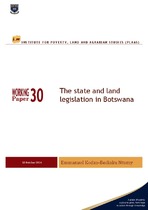| dc.contributor.author | Ntumy, Emmanuel Kodzo-Bediaku | |
| dc.date.accessioned | 2019-03-11T12:58:42Z | |
| dc.date.available | 2019-03-11T12:58:42Z | |
| dc.date.issued | 2014-10 | |
| dc.identifier.citation | Ntumy, EKB (2014) ‘The state and land legislation in Botswana', Working Paper 30. PLAAS, UWC: Bellville. | en_US |
| dc.identifier.uri | http://hdl.handle.net/10566/4497 | |
| dc.description.abstract | This paper aims to understand the political and legal dynamics involved in aspects of local
government in Botswana as exemplified by legislative enactments. Mawhood (1985) suggests
that such structures are charged with specific functions, for which specific scopes of authority
are conferred. The land boards of Botswana are one such example. The paper concludes that
there is a need to retrace the steps up to the inception of the Tribal Land Act (TLA), and to
examine aspects of the act itself, as well as its implementation and consequent effects and flaws.
Local government and governance are not achievable only by legislation and rule-making.
Legitimisation is also a key element. If land tenure transformation, use and administration in
Botswana via the medium of the land board system is to continue, it calls for a re-look at the
whole question of land and its centrality in development and the lives of the citizenry and,
therefore, the role of the land boards. | en_US |
| dc.language.iso | en | en_US |
| dc.publisher | Institute for Poverty, Land and Agrarian Studies, University of the Western Cape | en_US |
| dc.relation.ispartofseries | Working Paper;30 | |
| dc.subject | Land rights | en_US |
| dc.subject | Botswana | en_US |
| dc.subject | Land use policies | en_US |
| dc.subject | Tribal Land Act (TLA) | en_US |
| dc.subject | Land tenure | en_US |
| dc.title | The state and land legislation in Botswana | en_US |
| dc.type | Working Paper | en_US |

